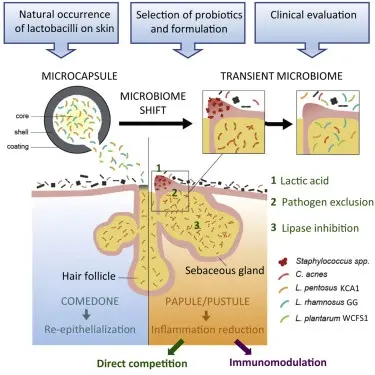Contents
- Acne and microbiome imbalances – what is the cause and what is the effect?
- What are the characteristics of the microbiome of skin prone to imperfections?
- What features of skin care products does this dictate, does their composition, application technique, care routine change?
- How can skin with imperfections be sensitive at the same time? Indeed, sensitivity is traditionally associated with the insufficiency of the stratum corneum, and with acne, the opposite is true.
- Traditionally, anti-blemish products contain active ingredients to dry and exfoliate the skin. How is this effect combined with calming and restoring?
- How do skin care products combine those ingredients that fight acne and those that restore the skin microbiome?
- Should everyone with imperfections use products that act on the microbiome, or in certain cases they are not necessary?
- Is it possible to influence the skin microbiome from the inside, through nutrition?
- Healthy-Food recommends
Five percent of a person’s weight is … microorganisms. The same microbiome that affects literally everything in our lives – from mood to the state of immunity and skin. It turned out that with problematic skin, there is an imbalance in the microbiome. So, it makes sense to choose care taking into account these features. We understand with the help of an expert how acne and the microbiome are connected and what to do with it all.
Acne and microbiome imbalances – what is the cause and what is the effect?
But it all starts with an increased sensitivity of the receptors of the cells of the sebaceous hair follicle to the sex hormones androgens. As a result, sebum production increases, microcomedones form in the skin, inflammation occurs and colonization by microorganisms increases.
What are the characteristics of the microbiome of skin prone to imperfections?
What features of skin care products does this dictate, does their composition, application technique, care routine change?
Often, owners of problem skin are overly actively struggling with manifestations of oiliness and imperfections, using aggressive products. Acne-prone skin needs an effective yet gentle cleansing. Therefore, it makes sense to use special tools, do not abuse cleaning devices (rags, brushes, mittens). And, most importantly, do not neglect hydration.
To cleanse problematic skin, both men and women require special products that help control acne and not overdry the skin.
How can skin with imperfections be sensitive at the same time? Indeed, sensitivity is traditionally associated with the insufficiency of the stratum corneum, and with acne, the opposite is true.
The thing is that one of the mechanisms of acne development is inflammation, which triggers a whole cascade of various reactions in the skin, which makes it sensitive. Therefore, with acne, we always talk about oily, but sensitive skin. Microbiome imbalance is also a factor in sensitivity.
Traditionally, anti-blemish products contain active ingredients to dry and exfoliate the skin. How is this effect combined with calming and restoring?
Indeed, many active ingredients in acne-prone skin products can have a drying effect. Therefore, special care is needed for oily, but overdried skin.
In the care of sensitive oily skin, moisturizing and soothing care is no less important than acne treatments themselves.
Research on the microbiome and its influence on the development of various skin conditions, including acne, has led to the emergence of skin care products that promote balance. This is a new approach that will be improved in the near future.
How do skin care products combine those ingredients that fight acne and those that restore the skin microbiome?
Should everyone with imperfections use products that act on the microbiome, or in certain cases they are not necessary?
Is it possible to influence the skin microbiome from the inside, through nutrition?
Sour-milk (but not milk!) and fermented foods can have a beneficial effect on the acne microbiome.
Healthy-Food recommends
We have written a lot about the care of problem skin and suitable products for this.
Special care for acne-prone skin is, in our opinion, an essential part of a comprehensive approach. Special products take into account the needs of such skin – oily, but overdried by drug treatment. An example is the Effaclar H Isobiome range of products from the La Roche-Posay dermatological laboratory. It includes a cleansing cream-gel and a revitalizing treatment to help restore comfort to the skin. The peculiarity of the La Roche-Posay brand is its special attention to the skin microbiome. Formulated with soothing panthenol and niacinamide, annatto extract to help fight imperfections, and the exclusive Filiformis Aqua Pose probiotic to benefit the skin microbiome.
On the one hand, this combination allows you to control imperfections, on the other hand, it moisturizes the skin, makes it softer and reduces the manifestations of sensitivity.










